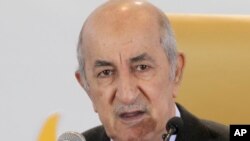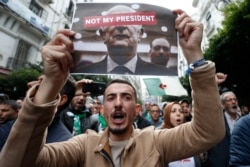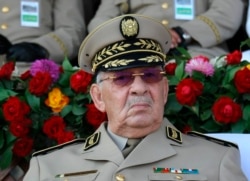Large crowds of protesters turned out in the capital, Algiers, on Friday despite word from the country's electoral commission that former Prime Minister Abdelmadjid Tebboune won a resounding victory in the presidential election.
Commission head Mohammed Sharfi said the preliminary results showed that Tebboune won 4,950,000 votes, or 58.15% of all ballots cast.
Sharfi said second-place finisher Abdel Qader Ben Grina captured 1,500,000, or 17%.
Official figures put voter turnout at 40% for Thursday's election, although many analysts said the real number was probably much lower.
Paul Sullivan, a professor at the U.S. National Defense University, told VOA that it was not clear where things might be heading in the postelection period, but that many Algerians were not pleased by the results.
"Where we might be heading now, I hope, is not toward violence, but Algeria has a history of violence related to elections,” Sullivan said. “The people of Algeria seem to be saying with the low turnout that they don't believe in how these elections are run and that their voice is not being listened to."
Sullivan added that the "length of the new president's tenure will reflect how well he listens to the voice [of the Algerian people]."
Algeria's protest movement opposes the predominance of the ruling elite in governing the country since independence from France in 1962.
Algerian analyst Ammar Ben Jeddah told Arab media that the new president "must offer some sort of concession to the protest movement, because if there is no national consensus, he won't be able to accomplish anything."
Ben Jeddah added, however, that he thought Tebboune understood the critical situation and the need to make a gesture toward the protest movement.
A picture posted on social media, showing Tebboune chatting with Army Chief of Staff General Ahmed Gaid Salah, caused some Algerians to question the new president's close ties to the military. Salah is widely thought to be the most powerful man in Algeria.
Tebboune maintains, however, that he hopes he is supported by the people and that he ran as an independent despite the fact that he belongs to the largest political party in the country.


